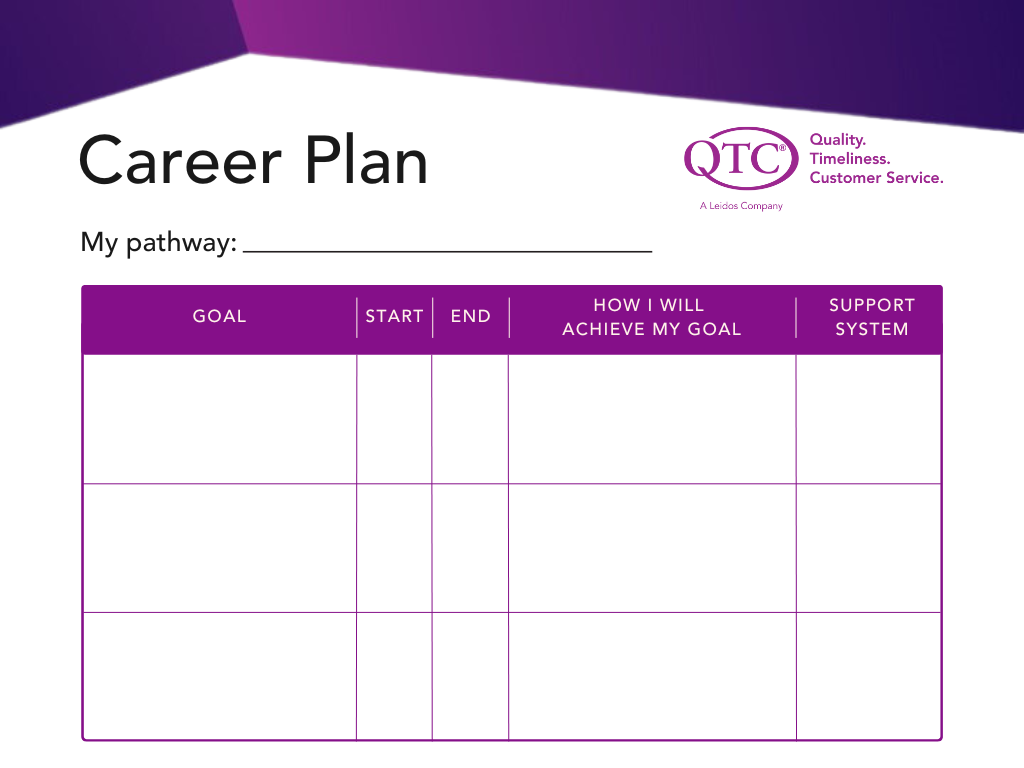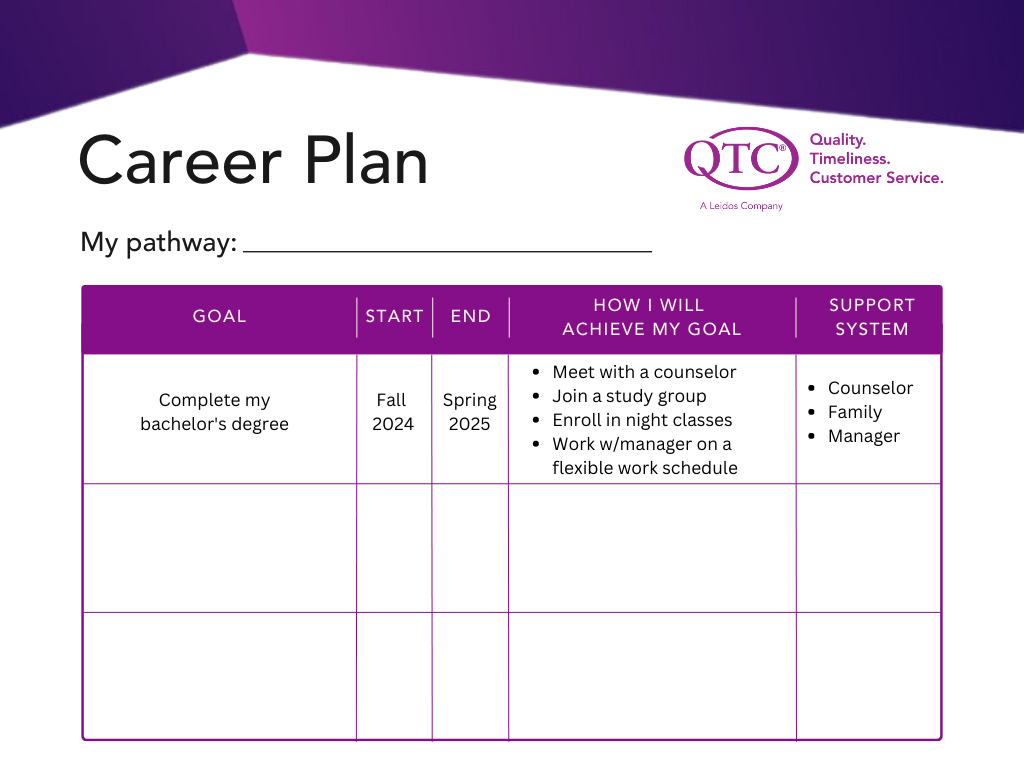
4 Tips to Help You Achieve Your Career Goals
In this article:
- Leidos QTC Health Services Career Planning template
- How to conduct a self-assessment
- How to research different career pathways
- How to decide which career pathway is right for you
Are you looking to make a change in your career?
We can help! In this article, we’re sharing four key tips from our Leidos QTC Health Services Career Toolkit that will help you map out your career, figure out a timeline, and find ways to grow.
We recommend working with a manager or mentor on this. They can provide you with guidance and help you identify strengths and skills that you may not recognize within yourself.
Tip 1: Conduct a self-assessment.
Before you make any decisions about your career, it’s important to get to know these parts of yourself:
- Your key strengths: What are you good at? What compliments have you received in the workplace?
- Your technical skills: What skills do you have that are relevant to the workforce? What tools or programs do you know how to use? What skills can you build upon or learn?
- Your work values: What’s important to you in a job? What kind of work environment do you thrive in?
- Your fields of interest: What kind of work would you like to do?
Once you answer those questions and have a better understanding of yourself, you can make more informed decisions about your career. This can help you find a job that aligns with your values.
Here’s an example of a Leidos QTC employee’s self-assessment:
- My key strengths: collaborating with my team, communicating with medical providers, strong work ethic, and adaptability to changes in the workplace.
- My technical skills: MS Office, SharePoint, medical coding, and I’m a LVN. Need to build upon my Excel skills.
- My work values: friendly coworkers, communicative teams, comprehensive benefits, and a competitive salary.
- My key fields of interest: Quality Assurance and Veteran Affairs.
Tip 2: Research your career pathways.
Now that you know what your strengths and interests are, it’s time to figure out which careers fit you best. We recommend mapping out three career pathways, so you can have options in case you change your mind.
As you map them out, keep these questions in mind:
- What are the educational and training requirements for this career? This could be a degree, certification, skill, or experience level.
- What does the future of this field look like? Figure out if the field is growing or shrinking and what job positions are available.
- How can you grow in this career? A large part of mapping out a career pathway is envisioning where you could be a few years from now. Think of how your long-term career goals fit into this pathway.
Here’s an example of a Leidos QTC Health Services employee’s answers:
Pathway Option 1: Medical Quality Assurance (QA) Specialist
- What are the educational and training requirements for this career? I need a high school diploma or GED, formal vocational training in the medical field, knowledge of anatomy and medical terminology, and the ability to read medical reports.
- What does the future of this field look like? Medical QA Specialists are in high demand at Leidos QTC Health Services.
- How can I grow in this career? I can grow within the company through applying for management positions or other internal job opportunities.
Tip 3: Evaluate each career path option.
You can start evaluating each pathway and figure out which one is right for you.
Ask yourself these questions:
- What are the perceived barriers or obstacles? What challenges or difficulties do you anticipate facing in this career? This includes any financial, educational, or personal barriers that could prevent you from pursuing this career.
- How can you realistically overcome the barriers or obstacles? Be solutions-oriented. For example, if you need to return to college, you can meet with financial aid counselors or apply for scholarships.
- Do you have any personal commitments? What other responsibilities do you have in your life, such as family, friends, or other interests? How will these commitments impact your ability to pursue this career?
- What’s the level of involvement required for this career? How much time and energy will this career require? Are you willing to make the necessary sacrifices to be successful in this career?
Your answers to these questions can help you narrow down your choices.
Here’s an example of a Leidos QTC Health Services employee’s answers:
- What are the perceived barriers or obstacles? I don’t have a lot of experience with medical documentation or military medical exams.
- How can I realistically overcome the barriers or obstacles? I can ask to receive training and find a mentor who can show me the ropes.
- Do I have any personal commitments? I have a young daughter and a husband, who also works full-time.
- What’s the level of involvement required for this career? It’s going to require some effort, but I can definitely do it if I reach out to management for support.
Tip 4: Create an action plan and set your goals.
To make your goals happen, you need to create a plan!
We created this Leidos QTC Health Services template for you to track your progress and stay motivated. It will help you keep all of your goals in one place.
We’ve included sections for:
- Your goal: Choose something you want to focus on completing.
- Start and end dates: Decide when you want to start your goal and when you want to achieve it.
- How you will achieve your goal: List out the steps you need to take.
- Your support system: Figure out who can help you achieve your goal. This includes family, coworkers, counselors, therapists, tutors, friends, etc.

Here’s an example of a Leidos QTC Health Services employee’s career plan:

Make Leidos QTC Health Services Part of Your Career Plan
We have more resources than ever before to support employees with their career development. We want them to reach their full potential and grow within Leidos QTC Health Services.
Are you looking for a workplace with career development resources and programs? According to LinkedIn’s 2023 Workplace Learning report, “Progress toward career goals” is the number one motivation for employees to learn.
To encourage that motivation, we offer:
- Higher education funding
- Mentorship program
- Leadership programs
- Work-life balance resources
- Part-time positions with benefits


0 comments on 4 Tips to Help You Achieve Your Career Goals